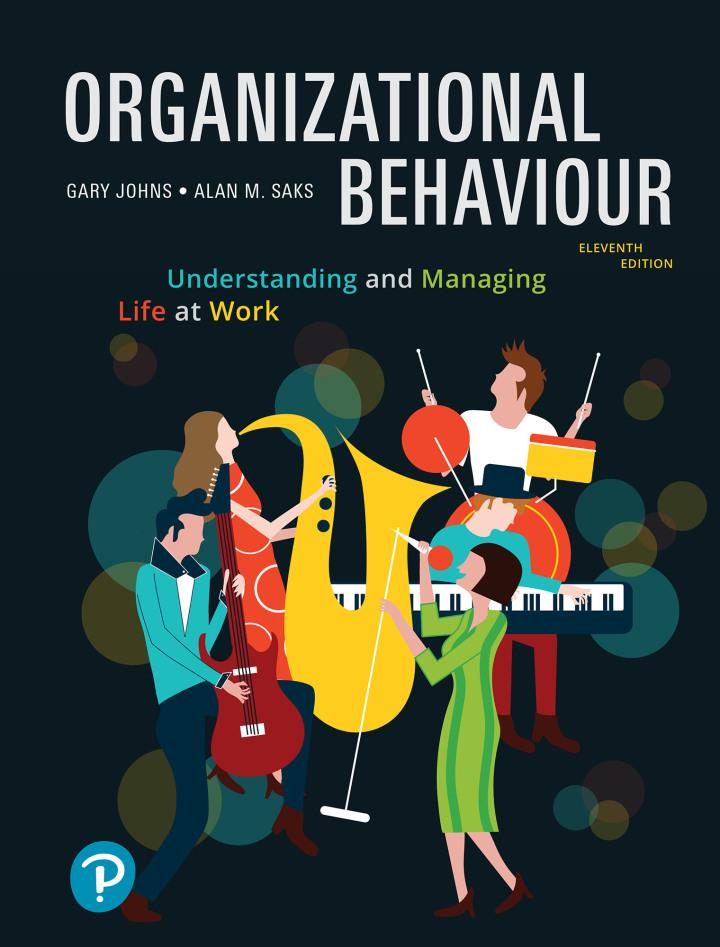As the deadline approached, Jairams days in the office included a combination of client meetings and e-mail
Question:
As the deadline approached, Jairam’s days in the office included a combination of client meetings and e-mail missives to her team members. At 11
a.m. and 4 p.m. each day, she promptly headed out the door to Dunkin’ Donuts to bring back drinks for her team. At 6 p.m., she would take dinner orders and bring them back. This arrangement worked nicely, except for one or two instances when she mixed up an order or two.
When she saw the dissatisfied look on her team members’ faces, she immediately offered to return to the donut shop or restaurant to get the correct order, which she did.
Two weeks before the deadline, Jairam knew that her project was in superb shape. She anticipated delivering the project a week early and indicated to Mishra (on only their fourth telephone meeting since she started at the company), that much more work was available. Mishra’s enthusiasm was evident in the tone of his voice and he congratulated Jairam on a job well done.
Returning to check on her team, Jairam asked them to take a five-minute break to discuss follow-on work. As she began talking about another upcoming project, she was interrupted by Vivek, who said that he had to get back to his coding. Jairam excused him from the meeting.
One of the remaining team members was surprised to hear about future projects. “We assumed you’d be heading back to India to get married,” he laughed. “How old are you? You must be no older than our daughters, who are all happily married now.”
Jairam was caught off guard. But she recovered and replied, saying that she had no intention of starting a family in the next few years. She was very excited about her prospects at Metropole, she offered, and she wished to be able to lead the company’s North American expansion. She indicated that she wanted to take on greater management responsibilities in the near future. At this point, Vivek returned to the room and conversation shifted to another topic. Jairam, wishing to leave them to their work, took their dinner orders and left to drive to the restaurant. The next day, Jairam returned to the office to hear that there was a minor issue: a section of code written for the project was not working out as expected. As the code was written in a software language familiar to her, Jairam asked to take a look at it. Immediately, she noticed the error and informed the team member how to correct it. Her team member appeared skeptical and, in front of Jairam, turned to his colleague for advice. His colleague looked over the section of code and confirmed that Jairam was correct. Jairam, pleased that her judgment was correct, smiled and walked away.
The client was visiting Metropole’s Newark site that day, and Jairam had planned a meeting and a facility tour. She assembled her entire team in a meeting room and was preparing to start her introduction when Vivek started speaking directly to the client. Vivek proudly indicated that the team was on-track to deliver the project a week ahead of schedule and that everyone had contributed greatly to the effort. Not wanting to interrupt the flow, Jairam remained silent, interjecting now and then to provide missing information. At the end of the client meeting, and as they were leaving to start the tour, Vivek turned to Jairam. He said, “I hope you don’t mind that I started that meeting. I was very pleased at my team’s effort and wanted to congratulate them in front of the client for the work they’ve put in thus far.”
Jairam assured him that it was no problem, that she was glad that he took the initiative. As they turned to rejoin the group, Vivek turned to her:
“Would you mind going to fetch us our teas? I’ll meet with the client and get us started on the next project. Remember, I like my tea extra hot.”
It dawned on Jairam that her relationship with her team might not be what she had assumed it to be. She was their project leader, and it did not seem right that she would not be present for the client meeting. As he hurried back to the group, Vivek added, “And by the way, when we met yesterday night, the team and I agreed that it would be helpful for me to resume my client contact duties. Let’s sit down later to see how you can refocus your efforts to target future clients.” Jairam was stunned. She had been unaware that the team had met the night before to discuss this. Did they even have the authority?
It was 11:30
a.m. in the morning, a half hour since the client had left on a facility tour with the team. Jairam had been standing in the same spot in the conference room, thinking about her reaction to what she believed was a sudden shift of events in the past few days. Although it was not clear what the issue was, she knew that something was wrong and had to be corrected immediately.
Did Anita Jairam’s past work experience help or hinder her integration into Metropole Services? Why?
Step by Step Answer:

Organizational Behaviour Understanding And Managing Life At Work
ISBN: 9780135218549
11th Edition
Authors: Gary Johns, Alan M Saks





